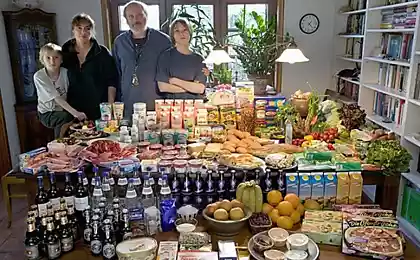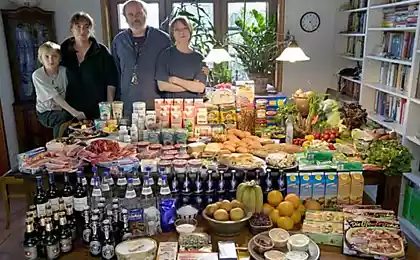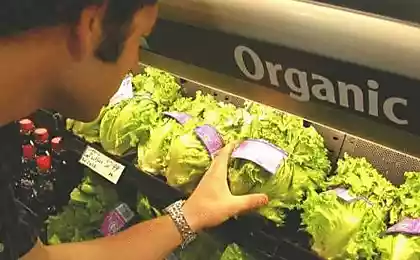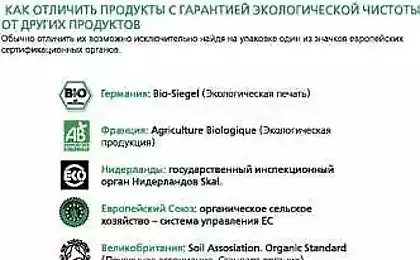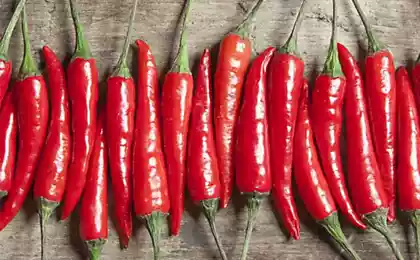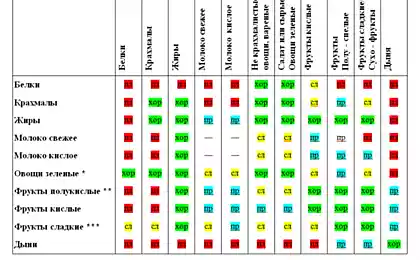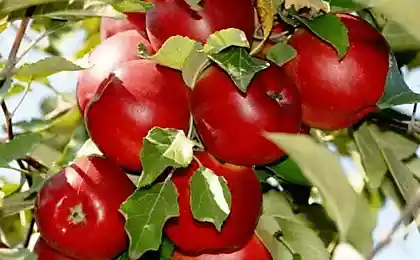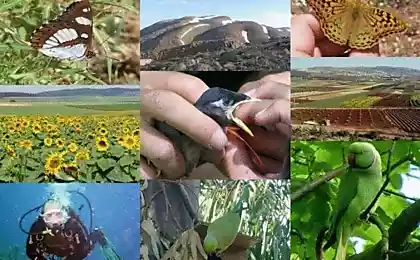543
Organic food— the benefits, features, selection rules
When, thanks to progress, you can create anything you want, albeit not always useful (in the case of food), of course, that the pendulum needs sooner or later to throw in the opposite direction: so we want healthy, organic products. This desire is satisfied newfangled trend biomechanism.
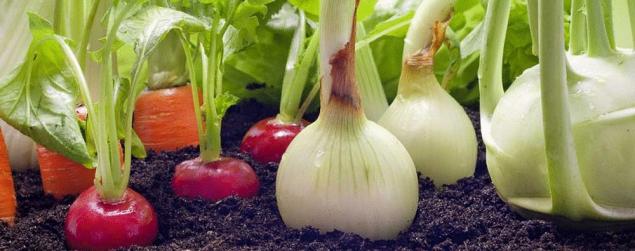
What is biomethane?
Biomethane is eating organic foods (organic food) which is made without the use (or minimal use) of synthetic pesticides, synthetic fertilizers, growth regulators, artificial food additives and without the use of genetically modified foods (GMOs).
The criteria for organic products:
Researchers from Cornell University (USA) found out that organic foods can lead to obesity! All because people are starting to forget that even the healthiest food has a certain nutritional value and carries a certain amount of calories, and start eating it are not guided by a sense of proportion. Thus, according to presented at the conference on experimental biology, Annaheim (CA, USA) according to the organic foods on average, I think 40% less calories than normal.
Biomethane in the world and in Russia
The concept of organic food emerged in the 20-ies of XX century, when chemicals began to actively use in agriculture. The main principles of biomethane steel improve the quality of agricultural production and environmental protection.
The official status of organic farming was found only in 40-ies of the last century, when England was founded first in the world certifier the Soil Association, which unites a number of farms. By the way, there are now more than 250 officially registered organizations, certifying biomethane.
Today in the world there are "organic" restaurants, shops and hotels. And for example, in Switzerland, anyone buying a ticket for the local train, can enjoy an organic lunch or dinner.
It should be noted that in CIS countries the system of certification of organic products is still in its infancy, so if you see the inscription on the packaging "organic", "bio" or "organic", know that it is not always a sign that before you do a natural product.
In Russia at the state level is still not fixed concepts such as "organic", "organic", "organic".
What can we say, if in 2008, according to Sanitary, signed by the chief state sanitary doctor Gennady Onishchenko, at that time in Russia there was not one certified organic producer.
But there is good news: almost a year how a Federal bill on the production of organic agricultural products, the probability that the last spring edition of the law, most likely, will be accepted.
How to choose organic products?
Rules for the selection of organic products:
Definitely expensive!
Organic product is a special method of production, valuable in the world and quality. So, the price special. Unfortunately, organic products in Russia is not cheap. A number of manufacturers claims that this is due to the production technology (the better the approach, the higher the cost of creating). Some experts argue the opposite: organic foods are grown without the use of herbicides and pesticides have a cost lower and the yield is higher than that of product "chemical" production, but in our reality it is stated the mark-up associated with the fact that their organic products have little, imported from abroad, respectively, on the shelves of organic food expensive.
Compare if the European organic food pays 20-40% more than ordinary, then we have the margin can be up to 600%!
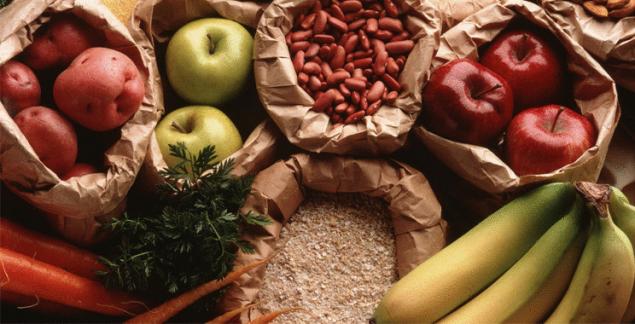
Alternative organic products: products from the country
As a variant of bipitalia many of us consider the consumption of vegetables, fruits, berries, grown with their own hands cottages. In General, it is considered a good alternative bioproducts mass production, but not perfect:
Source: www.gastronom.ru

What is biomethane?
Biomethane is eating organic foods (organic food) which is made without the use (or minimal use) of synthetic pesticides, synthetic fertilizers, growth regulators, artificial food additives and without the use of genetically modified foods (GMOs).
The criteria for organic products:
- produced without the use of harmful technologies (ultrasonic treatment, chemical preservation, nuclear fission, radiation treatment, aeration, etc.);
- not contain raw materials of agricultural origin, grown using pesticides, chemical fertilizers and other agricultural chemistry, hormones and growth stimulants and raw materials, grown near industrial centers;
- not include genetically modified organisms (GMOs) and products (GMP) and their derivatives;
- do not contain chemically synthesized preservatives, colorants, flavors, stabilizers and thickeners.
- organic products contain 50% more vitamins, minerals, nutrients and bioactive substances compared to conventional products;
- In organic products there are no harmful substances;
- such products have special taste and higher nutritional value.
Researchers from Cornell University (USA) found out that organic foods can lead to obesity! All because people are starting to forget that even the healthiest food has a certain nutritional value and carries a certain amount of calories, and start eating it are not guided by a sense of proportion. Thus, according to presented at the conference on experimental biology, Annaheim (CA, USA) according to the organic foods on average, I think 40% less calories than normal.
Biomethane in the world and in Russia
The concept of organic food emerged in the 20-ies of XX century, when chemicals began to actively use in agriculture. The main principles of biomethane steel improve the quality of agricultural production and environmental protection.
The official status of organic farming was found only in 40-ies of the last century, when England was founded first in the world certifier the Soil Association, which unites a number of farms. By the way, there are now more than 250 officially registered organizations, certifying biomethane.
Today in the world there are "organic" restaurants, shops and hotels. And for example, in Switzerland, anyone buying a ticket for the local train, can enjoy an organic lunch or dinner.
It should be noted that in CIS countries the system of certification of organic products is still in its infancy, so if you see the inscription on the packaging "organic", "bio" or "organic", know that it is not always a sign that before you do a natural product.
In Russia at the state level is still not fixed concepts such as "organic", "organic", "organic".
What can we say, if in 2008, according to Sanitary, signed by the chief state sanitary doctor Gennady Onishchenko, at that time in Russia there was not one certified organic producer.
But there is good news: almost a year how a Federal bill on the production of organic agricultural products, the probability that the last spring edition of the law, most likely, will be accepted.
How to choose organic products?
Rules for the selection of organic products:
- Please note-for special eco-labels on product of organic origin. For each country is their own. Please note once again that in Russia, such labeling does not exist. This means that many Russian manufacturers of unauthorized "appends" labeling "organic", "bio", etc., etc.
- Study the composition. Ideally, have a printout of the table of food additives with index E are to look to discharge what they are of those that indicated on the package.
- Also note the shelf life of products: organic milk can't MOPE for weeks, and the apples of summer grades will not be longer than 10-15 days.
- In choosing organic food you can trust to foreign producers, or to choose organic products in specialized ecomagazine or korinko.
Definitely expensive!
Organic product is a special method of production, valuable in the world and quality. So, the price special. Unfortunately, organic products in Russia is not cheap. A number of manufacturers claims that this is due to the production technology (the better the approach, the higher the cost of creating). Some experts argue the opposite: organic foods are grown without the use of herbicides and pesticides have a cost lower and the yield is higher than that of product "chemical" production, but in our reality it is stated the mark-up associated with the fact that their organic products have little, imported from abroad, respectively, on the shelves of organic food expensive.
Compare if the European organic food pays 20-40% more than ordinary, then we have the margin can be up to 600%!

Alternative organic products: products from the country
As a variant of bipitalia many of us consider the consumption of vegetables, fruits, berries, grown with their own hands cottages. In General, it is considered a good alternative bioproducts mass production, but not perfect:
- Often we grow food, knowing nothing about the land itself, the soil, its chemical composition. And the mass production of organic products begins with the certification of land.
- If we talk about milk, meat, etc., then again, not always I can confidently say the quality of food fed animals, which was the soil of the plants that they used. For example, in the production of organic milk, it is important that the cow grazed enough, lived in comfortable conditions (for example, the stall should not be close) and even, somehow, at slaughter have experienced less suffering. Moreover, there is even a requirement on the number of hectares per head: one adult dairy cow on the farm should be at least two hectares. Agree on their own with this approach to quality it is hard to compete!
Source: www.gastronom.ru




